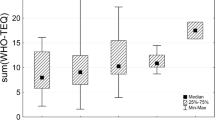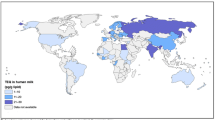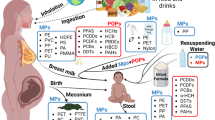Abstract
Breast milk should be the sole source of nutrients for infants for the first 6 months of life, and should also be a significant part of their diet in the months and even years that follow. A total diet study for young infants would then consists of one food – human milk. While breast milk is the optimal food for infants, chemical contaminants, particularly persistent organic pollutants (POPs), have been of growing concern because of their potential adverse health effects. The WHO Global Survey of POPs in Human Milk is discussed in the context of developments to reduce or eliminate emissions of POPs under the UNEP Stockholm Convention. The main features of the WHO protocol guidelines for the biomonitoring of human milk are presented.
Access this chapter
Tax calculation will be finalised at checkout
Purchases are for personal use only
Similar content being viewed by others
References
(2002) Global Strategy for Infant and Young Child Feeding, World Health Assembly and the Executive Board of UNICEF
Lang EP, Kunze FM, Prickett CS (1951) Occurrence of DDT in human fat and milk. AMA Arch Ind Hyg Occup Med 3:245–246
Carson R (1962) Silent spring. Houghton Mifflen, Boston
Wargo J (1996) Our children’s toxic legacy – how science and the law fail to protect us from pesticides. Yale University Press, New Haven/London, p 168
Pronczonk J, Moy G, Vallenas C (2004) Breast milk: an optimal food. Environ Health Perspect 121(13):A722
GEMS/Food = Global Environment Monitoring System/Food Contamination Monitoring and Assessment Programme
Schutz D, Moy GG, Kaferstein FK (1998) GEMS/FOOD International dietary survey: infant exposure to certain organochlorine contaminants from Breast Milk-A Risk Assessment, WHO/FSF/FOS98.4
Stockholm Convention on Persistent Organic Pollutants, http://chm.pops.int/Convention/tabid/54/language/en-US/Default.aspx#convtext. Accessed on 1 Feb 2010
United Nations Environmental Programme (UNEP) (2004) Chemicals, guidance for a global monitoring programme for persistent organic pollutants, 1st edn, June 2004. UNEP Chemicals, http://www.chem.unep.ch/gmn/guidancegpm.pdf
Van Leeuween FXR, Malish R (2002) Results of the third round of WHO-coordinated exposure study on the levels of PCBs, PCDDs and PCDFs in human milk. Organohologen Compd 56:311–316
Guidelines for Developing a National Protocol, Fourth WHO-Coordinated Survey of Human Milk for Persistent Organic Pollutants in Cooperation with UNEP, Revised 1 Oct 2007, http://www.who.int/foodsafety/chem/POPprotocol.pdf. Accessed on 1 Feb 2010
The list of members of the Advisory Group is available at http://www.who.int/foodsafety/chem/POPadvisory.pdf. Accessed on 1 Feb 2010
Martin van den Berg et al (2006) The 2005 World Health Organization Re-evaluation of Human and Mammalian Toxic Equivalency Factors for Dioxins and Dioxin-like Compounds. Tox Sci Advance, 2006. http://www.who.int/ipcs/assessment/tef_update/en/. Accessed on 1 Feb 2010
Author information
Authors and Affiliations
Corresponding author
Editor information
Editors and Affiliations
Rights and permissions
Copyright information
© 2013 Springer Science+Business Media New York
About this chapter
Cite this chapter
Park, S., Malisch, R., Moy, G.G. (2013). Total Diet Studies for Infants—Example of Persistent Organic Pollutants in Human Milk. In: Moy, G., Vannoort, R. (eds) Total Diet Studies. Springer, New York, NY. https://doi.org/10.1007/978-1-4419-7689-5_54
Download citation
DOI: https://doi.org/10.1007/978-1-4419-7689-5_54
Published:
Publisher Name: Springer, New York, NY
Print ISBN: 978-1-4419-7688-8
Online ISBN: 978-1-4419-7689-5
eBook Packages: Chemistry and Materials ScienceChemistry and Material Science (R0)




